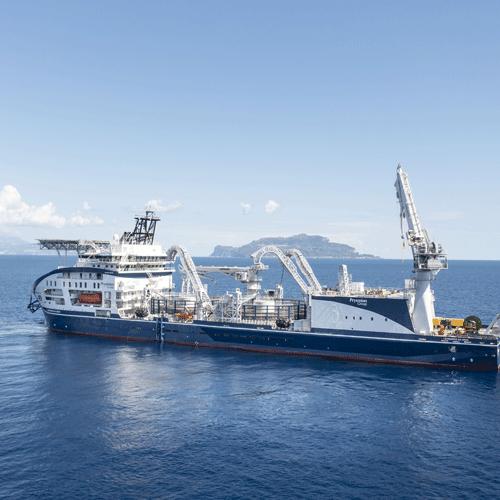General – Cable-Laying Vessel
Prysmian Group announces an investment of approximately €200 million in a new cutting-edge cable-layer plus adjustment for cables equipment of approximately €40 million.

The new vessel will be fully operational by Q1 2025 and will reinforce Prysmian’s project execution capabilities and its EPCI (Engineering, Procurement, Construction, Installation) approach.
As for Leonardo da Vinci, the new vessel will be built by the VARD Group. The new cable-laying vessel will be very similar to Leonardo da Vinci, which was delivered in 2021.
“The development of more efficient and sustainable power grids infrastructure is key to enable the energy transition, and submarine cables are an essential component. As global leader we are fully committed to technology innovation and we are happy to partner with worldwide leaders in the construction of vessels like Fincantieri and Vard to improve also our installation capabilities,” stated Valerio Battista, CEO Prysmian Group.
With substantially the same hull of Leonardo Da Vinci, a length of approximately 170 m and a breadth of about 34 m, the new cable-laying vessel will also be equipped with a similar cable installation equipment, such as: a first laying line with a capstan suitable for deep water installation at over 3,000 m; a second independent laying line with linear cable engines in order to increase operating flexibility; 2 carousels of 7,000 and 10,000 tonnes, which ensure the highest cable loading capacity in the market, enabling a reduced transportation time from the factory to the site, for an overall improved project efficiency.
The bollard pull will be in excess of 180 tonnes conferring the capability to perform complex installation operations and supporting a variety of burial tools.
The vessel will be equipped with state-of-the-art DP3 positioning and seakeeping systems, while the maximum transit speed will exceed 16 knots. Like Leonardo da Vinci, the new vessel will have green credentials: the high cable load capacity and navigation speed will significantly reduce the number of cable installation campaigns needed, compared to other vessels, thus enabling an overall decrease in CO2 emissions and a reduction in fuel consumption of approximately 40% compared to a traditional cable-laying vessel.
Moreover, the very efficient and green engines will cut NOX emissions by 85%, allowing the cable-layer to comply with the most stringent international environmental requirements. In addition, the new vessel will be equipped with a battery pack for a total power of 3 megawatt.
